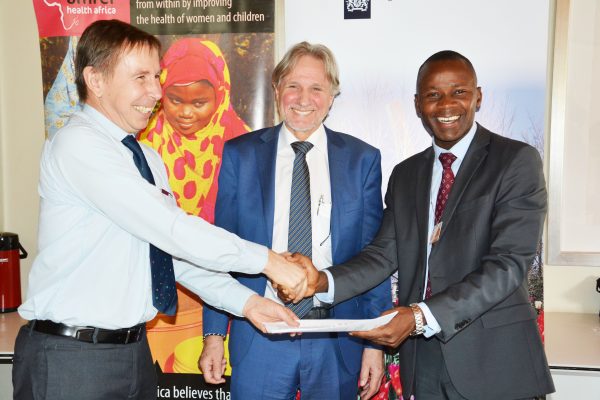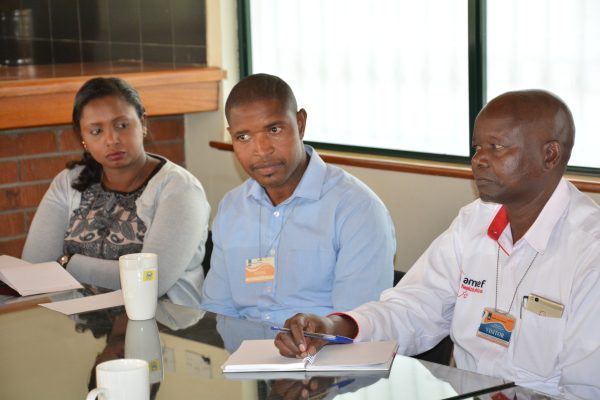Nairobi February 14, 2018… Amref Health Africa signed a partnership agreement with Netherlands-based waste and sanitation NGO, WASTE. The partnership aims to improve community health and sanitation in Africa.
The partnership is to scale up the public private partnership model called Financial Inclusion Improves Sanitation and Health in Kenya (FINISH INK), which has contributed to remarkable sanitation market development in Busia and Kilifi counties since 2013.
 The FINISH INK model has been instrumental in enabling families to obtain safe and sustainable toilets, paid for with their own money. Household and schools have constructed their own toilets as a result of demand creation for sanitation, sanitation marketing, entrepreneurial and technical trainings and toilet design improvements. In partnership with financial institutions, €3.9 million has been issued in sanitation loans, a unique microloan product developed under this partnership. Over 5,000 poor rural households now enjoy the benefits of having a safe toilet.
The FINISH INK model has been instrumental in enabling families to obtain safe and sustainable toilets, paid for with their own money. Household and schools have constructed their own toilets as a result of demand creation for sanitation, sanitation marketing, entrepreneurial and technical trainings and toilet design improvements. In partnership with financial institutions, €3.9 million has been issued in sanitation loans, a unique microloan product developed under this partnership. Over 5,000 poor rural households now enjoy the benefits of having a safe toilet.
“Access to a safe toilet is among the envisaged Sustainable Development Goals that contemplates universal access to water and sanitation to all by the year 2030,” Amref’s Director of the Institute of Capacity Development Dr George Kimathi said during the signing of the agreement.
Universal strategies for scaling up sanitation recognise that individual households must directly invest in sanitation, hence the effectiveness of the model due to the financial inclusion of communities in the provision of sanitation solutions.
Diarrhoea, a disease which is directly associated with inadequate sanitation, is the leading cause of child death in Sub-Saharan Africa. Universal access to water and proper sanitation to all will ensure reduction of disease and improve lives in communities. Partnerships between organisations will ensure that this is achieved.
Mr. Frans Makken, Netherlands Ambassador to Kenya emphasised the need for public private partnerships as a way to realizing the Sustainable Development Goals and the global economic agenda.” As we sign this agreement, I acknowledge the contributions of all our partners and donors, such as WASTE, which have enabled the success of the FINISH model in areas where it has been executed,” added Dr Kimathi.
He emphasised the need for more public and private investment to increase sustainable access to sanitation, especially for the rural poor. “An enabling environment is needed to attract private sector financing in the form of loans, bonds or equity, and innovative financing instruments,” he said.
The FINISH model has been greatly successful in Kilifi and Busia counties, as well as in India, and will now be scaled up to national level as well as cover more countries in Africa including, Tanzania, Uganda and Ethiopia.
 On his part, the Finance Director of WASTE, Mr. Valentin Post stated that the track record of the FINISH programmes in India and Kenya necessitates further scaling of the FINISH model with partners.
On his part, the Finance Director of WASTE, Mr. Valentin Post stated that the track record of the FINISH programmes in India and Kenya necessitates further scaling of the FINISH model with partners.
Partners include: Ministry of Health, Amref, WASTE, RVO/DGIS and financial partners Sidian Bank, Family Bank, Imarika SACCO, ACTIAM, Goodwell Investments, Take a Stake Fund, UNU-MERIT and FINISH Society.
